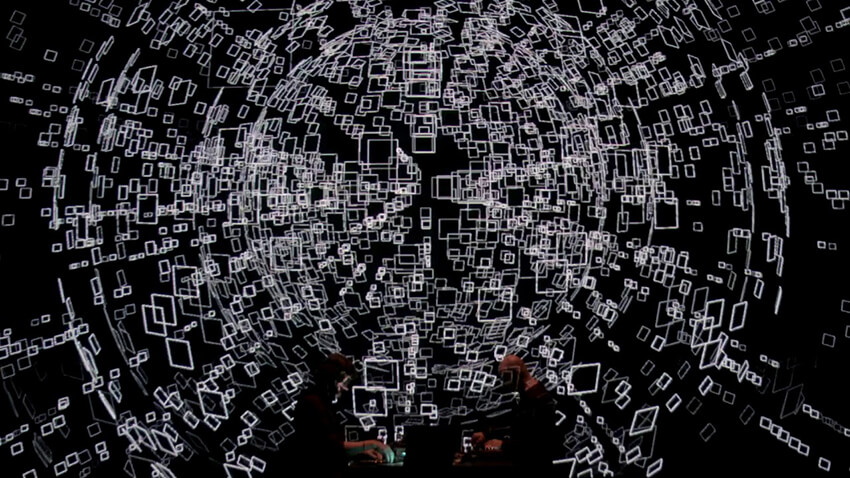Text by Jacobo García

Madatac is a new-media, art and technology festival that takes place in Madrid in the first months of the year. The 2019 edition of the festival makes its 10th anniversary under the theme Post-Digital Star. This year’s festival’s concept and the accompanying aesthetic play with the 1’s and 0’s that conform to the binary code but also define the more common decimal-based numeral system making a union on both human and tech under this 10-year anniversary aegis.
The festival commissioned by Ukranian/Spanish experimental underground legend Iury Lech has always brought a fresh breeze of the experimental vanguard to the sometimes isolated southern European capital. With important acts on the bill like Ryoji Ikeda or Kenta Nakagawa and five different venues hosting AV performances, film screening sessions, symposiums, talks and encounters and art installations, this edition was poised to be remarkable.
I dropped by Círculo de Bellas Artes (The Fine Arts Circle) to watch the performance of French composer and producer Franck Vigroux who was accompanied by visual artist Antoine Schmitt, both regular collaborators. The performance titled Chronostasis refers to a state developed by the illusion created by the neurons that are used to predict the near future, which is, in fact, the same neurons that the ones used to listen to music. Chronostasis takes glitches and bleeps as building blocks in the acoustic and visual aspects, using repetition and a few additional sonic elements as arrangements. Franck employs percussion sparsely and only when necessary.
Instead, he looks for elasticity and space, employing dissonance created with synthetic, monumental pads to create an oppressive, mechanical and manic soundscape. One wonders if this is the music of today’s post-industrial society, the soundtrack of a futurist dystopia or a left-of-field video game. Schmitt’s visual work successfully helps reinforce the idea of the dystopic movie or the video game, tridimensional, black and white spheres made of squares that spiral, convolute and disappear, as if it were a map of a universe that went awry.
Opening for them was Bromo, a young Spanish collaborative project between Paloma Peñarrubia musician, and producer and Azael Ferrer, a media artist both originating from Malaga. The show whirled around their first album, which goes by the title Traces of Erosion. Inspired in IDM music and conceived as an auditive documentary film, it uses the concept of erosion and the migrations that erosion can cause as a narrative center.
Sonically, the show develops up and down in dramatic crescendos just by cleverly employing a few basic elements: megalithic synths, broken rhythms, arpeggios and jarring, metalized melodies, accompanied by string – not really string – arrangements and, most importantly, visuals extracted from TV and other media which get mixed with computer-generated ones that allude to nature. Every element in Bromo’s show is employed to deliver an important message: ecological, environmental and social, something absolutely essential and contemporary to 2019, even if a bit exhausted.






